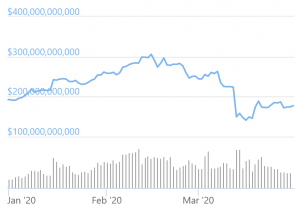Cryptonews Rewind 2020: Q1 – Missile Strike, COVID-19, Black Thursday
Here is what happened in the Cryptoworld in the first quarter of this year:

Total crypto market capitalization in Q1

January
The year started with Ethereum (ETH)‘s Muir Glacier, announced to be a successful upgrade on the Ethereum mainnet, and the Cryptoverse wondered if Ethereum 2.0 would happen in 2020. Spoiler alert: it made an important step in that direction.
And ETH 2.0 wasn’t the only major theme picking up speed in January: so was the bitcoin (BTC) halving. As pre-Bitcoin halving race pushed mining difficulty to record high, we discussed if BTC halving pattern would repeat this year. Another major news was that Bitcoin came one step closer to seeing its largest change since 2017, as a “pull request” was submitted for a significant code change that is designed to increase privacy of the coin, called Taproot.
And then, on day 3, the popular oft-debated narrative of BTC as a safe haven was tested once again, following the US strike in Iran. The safe haven narrative got its strongest confirmation in the wake of this strike and BTC showed growth as a legitimate asset class, said crypto market analysis firm Coin Metrics.
Coinbase was looking to recruit an office manager with accountancy, HR and building management skills, who’d be based in Tokyo, suggesting it was set to ramp up its presence in Japan.
Kraken revealed that it had been hit with a whopping 710 information requests from global law enforcement agencies in 2019. The US-based crypto exchange also finalized its takeover of Australia’s Bit Trade, a cryptocurrency financial services company.
The Singapore-based COSS exchange said it would deny its 200,000 customers from accessing around USD 2m worth of funds for several weeks while its site undergoes maintenance.
Huobi Japan struck a partnership with online bank Japan Net Bank.
The British High Court instructed Bitfinex to freeze a ransomware-linked bitcoin account with funds worth USD 860,000.
Meanwhile, while Binance aimed to find more merchants for its peer-to-peer (P2P) crypto trading platform in an attempt to meet “growing demand,” a resurfaced change in its whitepaper sparked transparency questions.
Russian Prime Minister Dmitry Medvedev underlined the need for his country to introduce digital asset token regulation at a legislative level, while there were indications that government-owned oil and gas companies might seek to introduce blockchain-powered tokens or cryptocurrencies into their business operations.
Japan’s Finance Minister Taro Aso warned bankers in the country of potential problems caused by China’s digital yuan launch – hinting that a Beijing-issued digital fiat could cause a rift between Tokyo and Washington.
Uzbekistan’s president produced a draft decree that would see tax authorities in the country waive taxes on cryptocurrency trading and transactions – for both Uzbeks and non-nationals living in the country. The South Korean government was also reviewing a proposal about introducing a tax on cryptocurrencies, a Spanish tax agency said it intended to intensify its scrutiny of crypto, while new Russian Prime Minister Mikhail Mishustin appeared keen to see the government adopt a crypto tax law by spring 2020. Britain’s highest tax authority, Her Majesty’s Revenue & Customs (HMRC), issued a request for blockchain analysis tools, with the goal to find and implement technology that allows the government to track and tax cryptocurrency users.
In South Korea, the Constitutional Court was set to pass judgment on the legality of measures taken by the country’s government during its partial crypto crackdown of late 2017 to 2018.
Venezuela was reportedly in talks with Cuba about using the Petro, the former’s state-issued token, in bilateral payments including trade deals.
Meanwhile, New York-headquartered international investment giant WisdomTree Investments, together with Abu Dhabi Investment Office (ADIO) and others, invested in Securrency. WisdomTree Investments also planned to launch a stablecoin ahead of the competition.
Instant messaging giant Telegram confirmed that its TON Wallet would not be integrated with their messenger service, after which its much-anticipated Gram token pre-sale was canceled and all funds returned to investors.
Meanwhile, its competitor Line was set to debut its own digital token in Japan on Bitmax, its own crypto exchange.
The central Bank of Lithuania approved a physical sample of the LBCoin, a token that it claimed would be the world’s first blockchain-powered digital commemorative coin issued in spring.

The market speculated that Ripple, an XRP-related blockchain company, may have had an initial public offering (IPO) planned for this year, as implied by CEO Brad Garlinghouse. Ripple also reduced sales of XRP from its escrow fund the previous quarter when it had secured USD 200m in funding.
In the increasingly complicated story, the infamous Bitcoin SV (BSV) supporter Craig Wright said that “a third party provided the necessary information and key slice to unlock the encrypted files” and that Wright gave the list of BTC holdings to the estate of his deceased partner David Kleiman, represented by his brother Ira Kleiman, while a document filed by Kleiman accused Wright of repeated forgery of documents and perjury.
The Cryptoverse was stunned when Jiang Zhuoer, CEO of one of the largest mining pools on Bitcoin Cash (BCH), BTC.TOP, said it planned to direct 12.5% of BCH coinbase rewards to a fund supporting Bitcoin Cash infrastructure; the proposal was supported by other large mining pools and signed by Zhuoer, Bitmain CEO Jihan Wu, Haipo Yang, and prominent BCH supporter Roger Ver. However, though a pool of anonymous Bitcoin Cash miners decided not to start a competing pool at that time, the “dev tax” was still on the table.
Meanwhile, another Bitcoin fork, Bitcoin Gold (BTG) suffered two 51% attacks in January.
The month was rough for Tron (TRX) too as two former BitTorrent employees sued it alleging workplace violence and wrongful dismissal.
And as vintage sardines became the talk of the Cryptoverse, controversial entrepreneur and former BTC bull John McAfee called his (in)famous USD 1m per BTC bet a ‘ruse’.
Peter Schiff lost the ability to access a BTC wallet, but the mystery was solved soon after.
Paris Saint-Germain launched a club-owned token named PSG. Also, Kobe Bryant died, and the Cryptoverse remembered his visit.
This was also the time when the novel COVID-19 virus was just picking up speed. Another thing that started cooking in January: US presidential elections, with Andrew Yang calling again for a framework of crypto regulations to be developed.
February
Ethereum’s core devs decided to implement ProgPow (programmatic proof-of-work) in July amid heavy opposition that only grew larger.
Total value locked in decentralized finance (DeFi) hit 1 billion, and it was just the beginning.
But it was now pretty clear that bitcoin is rallying, breaking through the USD 10,000 level, which was also just the beginning of what’s to come.
The South Korean central bank decided to launch a second central bank digital currencies (CBDC) team in what appears to be a direct response to China’s plans to issue a digital yuan, while the head of the US Federal Reserve suggested that a “digital dollar” might well be in the pipelines.
The US Internal Revenue Service (IRS) freed taxpayers from tax on gaming transactions carried out with virtual cash, but crypto regulation remained hazy.
In Japan, fourteen of the country’s biggest banks and securities companies began a pilot for a blockchain-powered inheritance platform. Beijing launched a blockchain-powered loans platform, and a number of Alibaba subsidiaries started offering blockchain-powered online “contactless bidding” features.
Food and animal safety Neogen Corporation partnered with blockchain firm Ripe Technology for tracking food and animal sources, while Deutsche Telekom, T-Mobile US, Telefónica, and Orange said they would pilot a blockchain-powered solution for automated roaming management.
OKChain testnet and OKEx DEX went live, and so did the beta version of Block.one‘s decentralized social media platform Voice – though not for all. Meanwhile, EOS’ block producers made a decision to reduce network inflation, causing another decentralization debate.
The public war-of-words between the co-founders of the IOTA Foundation took a new turn, with one announcing legal proceedings against the other.
Crypto derivatives exchange FTX added the TRUMP-2020 futures contract for folks to bet money on the outcome of the US presidential election.

Coinbase became a credit card giant Visa principal member, while Binance encountered issues, pausing most trading services.
Poloniex rolled back 12 minutes of trading history after a bug detected in the system caused trades to be “executed erroneously,” Singapore’s Court of Appeal ruled that Quoine wrongfully reversed a number of trades made on its platform, and there was no reprieve for LocalBitcoins traders whose BTC was locked up. Despite their positive results, Bitspark said it would be shutting down.
Fcoin also went down, reporting damaged systems and lost data, and its founder said they had no money to pay back users – they decided to reopen but clients weren’t happy.
And then there were the attacks. Litecoin (LTC) creator Charlie Lee called DeFi a “decentralized fiatre” after an attack on DeFi platform bZx, which was followed by a second attack. IOTA’s Trinity wallet was hacked. That’s not all, as both OKEx and Bitfinex suffered DDoS attacks.
Meanwhile, Ripple partnered with the National Bank of Egypt, known as the largest state-owned bank in the country, but the USD 500bn card they pulled didn’t help Ripple in court.
Many other events made headlines. Hedera Hashgraph (HBAR) started working with Google Cloud in several areas, Huobi exchange joined LG in the governance council of Klaytn (KLAY), Samsung unveiled their new flagship smartphones but played hide-and-seek with the Cryptoverse, investment banking giant JPMorgan Chase‘s blockchain unit Quorum was said to be set for merging with blockchain company ConsenSys, and Sony showed their interest in security tokens.
Meanwhile, Justin Sun faced more trouble as Warren Buffett denied owing crypto and Steem moved to restrict power over the blockchain and the most popular app Steemit.
February certainly had its ups and downs. North Korean hackers reportedly used LinkedIn and Telegram for a USD 7m DragonEx exchange hack, and MLB players were allegedly among the victims of an American crypto fund scam. On the other hand, we started using BTC emoji in our tweets, Namebase and its blockchain Handshake went live and introduced a new way to send our crypto, and crypto mass adoption was “confirmed” by The Simpsons, Vodafone, and Willy Woo.
March
The beginning of March saw India’s Supreme Court overturn the crypto ban, though the fight wasn’t over yet.
And in a dramatic turnaround, the South Korean National Assembly voted in favor of the country’s first cryptocurrency-specific legislation.
And then: breaking news. Bitcoin dropped suddenly to January lows, while altcoins suffered major losses, crashing more and as low as USD 4,000, leading some exchanges to take emergency measures. The day of the crash became known as the Black Thursday.

Coin Metrics found that it’s the short-term traders again who were driving the sell-off. Bitcoin and major altcoins reversed losses in the second half of March, which coincided with the US Federal Reserve announcing unprecedented measures to support the economy.
Meanwhile, Ripple would not have been where it was without the monthly selling from its massive holding of XRP tokens, said the CEO.
Tron and Steem implemented a hard fork in what many in the community called a hostile takeover of Steemit, prompting developers and dapps to leave the ecosystem in protest. The Steem community decided to end the battle with Justin Sun and the Tron Foundation by moving Steem to the newly-launched Hive network. The Hive blockchain launched, and HIVE coin was listed just a day after.
In the land of exchanges, Coinbase became a second-tier member of the Japan Virtual Currency Exchange Association (JVCEA), and it said it would allow its app users direct access to crypto lending platforms.
Binance halted trading again, with the confusion and frustration among its users growing.
In an attempt to increase liquidity for institutional crypto investors, Bitfinex onboarded a USD 280m crypto hedge fund Fulgur Alpha.
In Japan, Tokyo police said that suspected Coincheck hackers were arrested after selling NEM (XEM) for bitcoin.
NXC, the South Korean operator of the Bitstamp and Korbit crypto exchanges, launched a new crypto subsidiary, with plans to open a third trading platform.
Then, Chinese President Xi Jinping voiced fresh support for blockchain, praising its ability to aid efforts to fight the spread of the pandemic.
Chinese smartphone giant Xiaomi set up a joint venture to focus on new business areas, including blockchain; Beijing started piloting blockchain-based electronic invoicing in an attempt to reduce costs, and the blockchain-powered trade finance platform developed by the State Administration of Foreign Exchange (SAFE) processed cross-border payments worth USD 56.36m and completed export financing totaling USD 460m as part of a pilot. Also, Chinese province of Gansu said that all of its cities were now covered by its Blockchain Service Network (BSN) service platform.
Back in South Korea, the country discussed turning to a blockchain-powered fix for COVID-19’s economic fallout, in the form of stablecoin handouts, and Hdac, the cryptocurrency subsidiary of Hyundai, launched the first decentralized app (dapp) on its blockchain network.
Telegram lost a legal round against the SEC, while Kik Interactive was just starting another round. A securities class action lawsuit was filed against major producer of BTC mining equipment Canaan, and after a lengthy battle, the Tezos Foundation settled a lawsuit outside of court.
Taiwanese tech giant HTC announced the release of a new crypto 5G hotspot, the Exodus 5G Hub. Samsung told us in which seventeen countries its Blockchain Keystore was available at the time, confirming it’s installed on the Galaxy S20 and Galaxy Z Flip.
American users of the Opera mobile and desktop web browsers got the ability to use their debit cards to buy both BTC and ETH directly from the browser’s crypto wallet using Apple Pay.
Meanwhile, much of March was about the pandemic, and for a good reason. By this point, the virus had permeated almost each and every part of our exitance. In the Cryptoverse, Zhen Ju Yong, Torus Labs‘ CEO was diagnosed with COVID-19 and he warned other attendees of Ethereum conferences he had attended to get tested. Days later, it was revealed that 18 more Ethereum conference attendees tested positive for coronavirus, but Vitalik Buterin confirmed he had no symptoms.
Also, arch crypto-skeptic Nouriel Roubini proposed an ingenious solution to the financial crisis brought about by the pandemic, which sounded much like tokenization.
Near the end of March, the US Democratic Party shared two lengthy draft bills proposing the creation of a digital dollar and a digital wallet. In either case, politicians were building a case for bitcoin.
And two men accused of setting up the BitClub Network, a crypto mining Ponzi that allegedly duped investors out of USD 722m, petitioned a federal judge to release them from a county jail, fearing they could contract the coronavirus.
And this was the end of the first, eventful quarter of an equally eventful year. Just wait to be reminded (tomorrow, December 29) what Q2 put on our tables.
__
What other news from the first quarter you would like to add to this list? Let us know in the comments below.
__
Learn more:
Bitcoin, Ethereum, XRP, Bitcoin Cash, Litecoin, Chainlink Price Predictions for 2021




